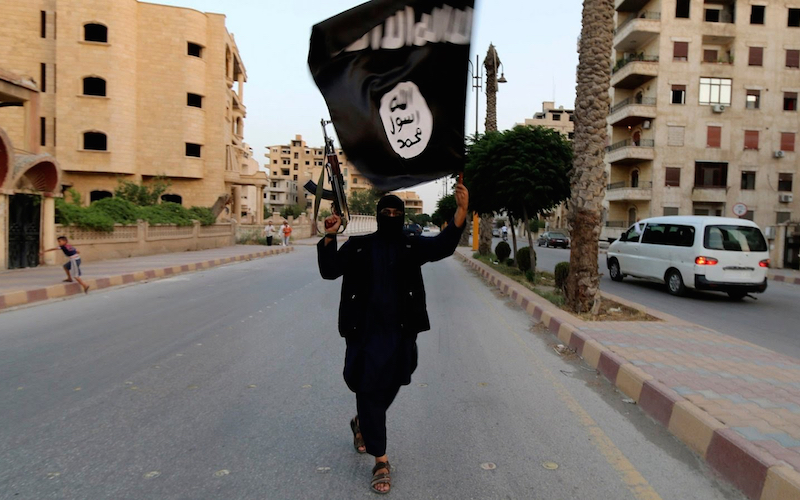
The ISIS Threat in Southeast Asia
Indonesian Ahmad Junaedi, on trial in Jakarta after joining the ranks of Islamic State fighters in Syria, says he was deceived by recruiters who promised good pay and a meaningful role in advancing Islam and its “caliphate” under ISIS rule. He was even more disillusioned by the perversity of the Islamic extremism that he initially embraced before returning to Indonesia, where counterterrorism officials hope that Junaedi’s experience serves as a cautionary tale to dissuade others from the ISIS journey.
Their hopes are not entirely displaced as the nation, along with neighboring Malaysia and parts of southern Thailand, renews their efforts to contain the spread of ISIS-inspired radicalization that leads to both the recruitment of fighters headed for the Middle East and the potential for terrorism at home. The spread of the Islamic State to Southeast Asia is top on the minds for Indonesian officials all too familiar with extremist attacks, and Junaedi’s experience underscores just how daunting is the task of controlling it.
The best estimates suggest that successful ISIS recruitment has tripled in the past year, with at least half of the 500 Indonesian recruits fighting in Iraq and Syria.
That’s more citizens than al-Qaeda attracted to the war in Afghanistan, but more sobering is the less-straightforward strategy of ISIS recruiters who attract entire families seeking to live in a theocratic Islamic culture. They’re joined by about 200 Malaysians persuaded by tech-savvy ISIS messages on social media and echoed by some local Muslim leaders.
Islamic State support across Southeast Asia has the attention of global leaders near and far, ranging from the Prime Minister Lee Hsien Loong in Singapore to President Obama and the United States Department of State.
Malaysia and Singapore have joined the U.S. and other nations in the Global Coalition to Counter ISIL. They are the only ASEAN nations to do so. Malaysian officials plan a regional counterterrorism center focused on digital messaging that targets Muslims in Southeast Asia. Indonesia banned support for ISIS as of August 2014 and continues to develop a related legal process to enforce it, with an additional ban on travel and less effective measures to shut down pro-ISIS media. However, Jakarta is lagging behind: supporters cannot be arrested and Indonesians are legally allowed to travel overseas for military training.
Indeed, some regional counterterrorism experts concede that the clock is ticking and it’s only a matter of time before there is an ISIS attack in Indonesia. A Pew Research study indicates that in Indonesia an unnerving 72% of Muslims are already in favor of living under Shariah law.
Messaging Islamic militancy to Muslims
To be sure, there are important nuances and complexities about how Muslims envision the future of their countries’ legal structure and culture, and countless leaders who call on their followers to reject ISIS. They include the Sultan of Pahang who told Malaysians to exercise tolerance in keeping with Muslim practice, and reject the heinous acts of ISIS and their inconsistencies with Islam. Malaysia has steadily emerged as a prime fighter in the war against ISIS. Officials have arrested dozens of suspected militants despite the nation’s own Muslim culture. Moreover, according to the State Department’s own reports, the country has agreed to share intelligence with the US and has cracked down hard on ISIS-affiliated financing networks and has placed “no travel” alerts on the passports of suspected jihadists. Earlier in October, Malaysian authorities arrested a Kosovar hacker linked to the terror group who had allegedly leaked information about more than 1300 American service members. What’s more, the country was chosen by the US to set up a regional center to counter ISIS online and social media propaganda by the end of the year.
Because Islamic extremists have long been a reality in Southeast Asia, there is a familiarity to the ISIS message as well. As radicalized Indonesian groups at home join the fight, they assist ISIS with translation and other media-related recruiting tasks, threaten violence as they demand release of their pro-ISIS brethren held in Indonesian prisons, and operate with a unified voice under a pro-ISIS umbrella group. Their leaders call for attacks on Indonesian military targets and have allegedly funded plans to attack Christian and Buddhist worship sites as well as police units. The threat in Southeast Asia is not negligible, and Indonesia’s history in particular demands a coordinated, effective response to counter ISIS’ growth.
That response must include more than international counterterrorism centers, military action and controversial new laws challenged by human rights advocates, as is the case in Malaysia. Prime Minister Datuk Seri Najib Razak, speaking this week at a United Nations Association of Malaysia dinner in Kuala Lumpur, stressed the need for social justice, an inclusive framework of economic development, good governance and a commitment to democracy to create a multi-pronged approach to terrorism, even as he admitted that religious extremism has spread to Malaysia, and called on neighboring nations to unite.
“For centuries, South East Asia has been enriched by the assimilation and integration of different peoples and traditions, with a culture that has welcomed and benefitted from diversity,” Najib said. “We in Malaysia and ASEAN must strive to maintain this way of life, and reject extremism and exclusivism.”
